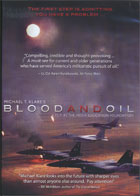
Blood and Oil 2008
Distributed by Media Education Foundation, 60 Masonic St., Northampton, MA 01060; 800-897-0089
Produced by Scott Morris
Directed by Jeremy Earp and Scott Morris
DVD , color, 52 min.
College - Adult
History, International Relations, Middle Eastern Studies, Political Science
Date Entered: 09/18/2008
Reviewed by Rebecca Adler, College of Staten Island, City University of New YorkLaying his case out rather like a seasoned prosecutor, Michael T. Klare incontrovertibly and beyond a doubt demonstrates in this film that, as writer Jim Holt put it, It’s the oil, stupid! Not that the film doesn’t open with Bill O’Reilly and Sean Hannity separately ridiculing the very idea. But in this documentary structured as a kind of illustrated lecture, Klare, Five College Professor at Hampshire College, convincingly shows that, more than any other factor, it’s the insatiable appetite for oil that has driven American foreign policy since the end of World War II—not only in the Middle East but elsewhere in the world as well. The evidence overwhelms. Beginning with President Franklin Delano Roosevelt, who met King Abdul Aziz on February 14, 1945 in the Suez Canal on the deck of the USS Quincy—FDR was to die less than two months later—all the way to George W. Bush, just about every American president is seen in some state of captivation by the reigning Saudi monarch. Here was FDR, Klare says, the newly acknowledged leader of the free world, kowtowing to an absolute monarch who practiced slavery, carried out public executions for crimes such as adultery, but who nevertheless got a pass. The reason is readily at hand. It was to assure a steady flow of oil to fuel the American economy and way of life. American oil deposits, a non-renewable energy source, were understandably gradually diminishing, while Saudi Arabia sat on 85% of the world’s reserves. Even decisions taken during the Cold War, Klare insists, were based on protecting the Middle East oil flow from possible Soviet takeover. Thus the Truman, Eisenhower, Reagan, and especially Carter Doctrines. And in 1953 the CIA, citing a Soviet threat, engineered a coup against the democratically elected prime minister of Iran, Mohammad Mossadegh, after he nationalized the Iranian reserves. At present, with 25% of the world’s population, the US consumes 75% of the world’s oil output, and the proportion of that consumption coming from foreign sources, ballooning the nation’s foreign debt, has now grown to something like 60%. We even see and hear oilman George W. Bush, who made sure Osama Bin Laden’s family members were allowed to leave the country immediately after 9/11, state that America is, quote, addicted to oil, a bad thing. Klare goes so far as to claim that Bin Laden, an ally of the US when he fought against the Soviets in Afghanistan, turned against the country only after the US broke a promise and remained in Saudi Arabia following the First Gulf War. (Bin Laden had apparently offered the King to fend off Iraq with his own forces; the King agreed to invite the US instead, on the understanding that the US would quit the sacred land after victory.) Accompanying Klare’s words are graphic images coming from numerous sources – newsrooms, television footage, archival film from presidential libraries, etc. The documentary doesn’t pretend a balanced view. This is the case for the prosecution, and it’s persuasive. Whereas poll after poll showed that the US people were not ready to go to war in order to keep oil flowing from the Middle East, we hear former Secretary of State James Baker III flatly declare that had been and still is US policy. The cost in human lives of having pursued the policy is incalculable…. Hence the title of the film, Blood and Oil, which is based on Klare’s 2004 book of the same name. Interestingly, a similar message was sent, if only metaphorically, by the 2007 Paul Thomas Anderson film based on a novel by Upton Sinclair. The title of Sinclair’s 1927 novel is simply Oil. For his film set in California of the 1900s oil rush, Anderson chose the awkward ominous title There Will Be Blood. (Also included on the DVD is a very worthwhile twenty-six minute lecture by Klare to a college class summarizing the main points of the film and the book.) Highly recommended.